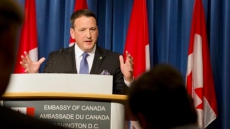OTTAWA — Perhaps an era of cheap crude won't be so bad for Canada after all.
A new bank forecast argues the financial blows of low oil prices on the Canadian economy could be more than cancelled out by the weaker loonie and additional consumer spending on both sides of the Canada-U.S. border.
The prediction, contained in a Royal Bank of Canada (TSX:RY) report released Monday, is an outlier among many expert assessments that have projected low crude prices to be a net negative for Canada.
The bank analysis pointed to a combined effect of three "offsetting positive outcomes" from low-priced crude: a boost for the U.S. economy; the lower Canadian dollar's benefit to exporters selling to the stronger U.S. market, and more spending by Canadians thanks to cheaper fuel.
The paper's authors, however, are careful to underscore a key risk to the projection: cuts to business investment in Canada's important oil and gas sector.
They warned reductions to oil-production investment are "more certain to occur" than the positive, counteracting forces of lower-priced crude.
"Will consumers spend the savings realized at the gas pumps? Will Canadian exporters more aggressively seek out markets for their goods benefiting from the strengthening U.S. economy and a weaker Canadian dollar?" authors of the RBC Economics report ask.
"Our current Canadian forecast assumes that both consumers and exporters will respond to these incentives that will slightly more than offset the expected weakening in oil-sector investment."
RBC based its prediction on an assumed average price of US$65 per barrel in 2015 and US$74 in 2016.
A benchmark crude called West Texas Intermediate briefly traded below US$50 on Monday for the first time in five years. Crude later rebounded a bit but remained below last week's levels and less than half the US$107 perch in June.
That rapid drop in oil prices has been creating concern in some parts of Canada, as it threatens the bottom lines for oil-producing provinces as well as the federal government.
In November, Ottawa's fall economic update warned cheaper crude could drain $500 million from federal coffers in 2014 and $2.5 billion per year between 2015 to 2019. It also said it could slash Canada's nominal gross domestic product by $3 billion in 2014 and $16 billion annually from 2015 to 2019.
Last month, federal Finance Minister Joe Oliver said his department was keeping a close watch on the shifting prices, but insisted Ottawa would still attain its long-promised budgetary surplus in 2015-16.
Bank of Canada governor Stephen Poloz has also examined the potential oil-price fallout, cautioning it could slow the pace of the country's GDP growth by a third of a percentage point.
The RBC report said lower oil prices will have significant impacts on government budgets in oil-producing provinces.
But it argues these provinces — Alberta, Saskatchewan and Newfoundland and Labrador — have seen big increases in revenues from price increases in recent years, putting them on relatively strong footing to absorb the shocks of a prolonged decline.
Other provinces, meanwhile, are seeing benefits from the low crude prices in the form of cheap gasoline and the falling loonie, which is creating a better climate for their manufacturers and exporters.





